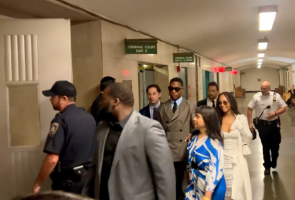At this year’s Above & Beyond Awards, Sanctuary is honoring an extraordinary team of attorneys from Sullivan & Cromwell LLP who achieved a ground-breaking appellate victory for their pro bono client Nicole Addimando and survivors of domestic violence across New York state. The S&C team includes Garrard Beeney, Amanda Davidoff, Kamil Shields, Tim Weinstein, James Browne, Samantha Briggs, Alexander Self, and Jennifer Lee.
Nicole’s Case
In 2017, Nicole, a loving and proud mother of two young children from Poughkeepsie, NY, was enduring unspeakable violence at the hands of her children’s father, Chris. The two had begun dating when Nicole was 19 years old, and Chris became increasingly abusive over the course of their nine-year relationship. He regularly subjected Nicole to sadistic sexual and physical violence, threats, and psychological and emotional abuse. One night in 2017, Chris brandished a gun and threatened to kill Nicole then himself, leaving their children without parents. Nicole used the gun against Chris, killing him.
The Trial Court Proceedings
In April 2020, a jury convicted Nicole of second-degree murder and second-degree criminal possession of a weapon. During the sentencing phase, Nicole’s trial counsel requested application of the Domestic Violence Survivor Justice Act (the “DVSJA”), which allows judges to impose a reduced sentence if the defendant was “a victim of domestic violence subjected to substantial physical, sexual or psychological abuse inflicted by a member of the same family or household,” the abuse was “a significant contributing factor” to the crime, and, taking all of the circumstances into a count, a standard sentence would be “unduly harsh.”
Opposing the application of the DVSJA to Nicole, the prosecution presented various purported explanations to minimize the documented evidence of extreme abuse that Nicole survived—including photographs and medical documentation that she had been beaten, burned, sodomized by objects, and had her head slammed against countertops, among other abuse. Indeed, lawyers at Sanctuary for Families who assisted in the case have described Nicole’s history of abuse as among the most extreme that they have ever seen. In the face of this overwhelming evidence, the prosecutor relied on abhorrent, outdated, and fundamentally incorrect notions about the realities of domestic violence. She argued that, if Nicole was abused at all, it must have been self-inflicted or at the hands of someone other than her domestic partner; or if this extreme violence was perpetrated by Chris, it must have been consensual; or if it was not consensual, Nicole could have simply left him.
Based on a deeply flawed understanding of the dynamics of domestic violence, the judge concluded that the DVSJA should not apply and sentenced Nicole to an indeterminate sentence of 19 years to life in prison.
S&C’s Representation of Nicole on Appeal
By the time Nicole was sentenced, Sanctuary had approached S&C about representing Nicole on appeal. Garrard Beeney, an S&C partner and Sanctuary Board member, was undaunted by the multi-thousand-page trial transcript and lengthy pre-trial and pre-DVSJA-hearing history. “I looked through the opening statements and closing arguments,” Beeney recalled. “I think that made clear to us at a point before sentencing that there had been, in many respects, a miscarriage of justice in the way that the case had been presented to the jury, at least in the sense of ignoring what we know about survivors of domestic violence and the science of domestic violence.”
The S&C team formed a coalition of advocates including Sanctuary, the Legal Aid Society, and Nicole’s trial counsel to challenge Nicole’s conviction and the court’s refusal to apply the DVSJA at her sentencing. Working with this coalition, Sanctuary coordinated the filing of two amicus briefs—a brief on behalf of domestic violence service providers on the impact of trauma on domestic violence survivors’ memories and decisions, and a brief on behalf of certain New York state legislators who drafted and passed the DVSJA detailing the statute’s legislative history and intent. An amicus also was filed by the Association of the Bar of the City of New York.
Meanwhile, the S&C team worked tirelessly on the appeal, strategizing on the legal issues most likely to achieve the best result for Nicole, researching and briefing the legal arguments, and ultimately arguing the appeal before a panel of the New York Appellate Division, Second Department. During an extraordinary oral argument that lasted nearly two hours (and can be viewed here), the Appellate Division panel lobbed question after question at Beeney to probe the contours of the DVSJA.
As Nicole Fidler, director of Sanctuary’s Pro Bono Program, and Ross Kramer, Director of Sanctuary’s Incarcerated Gender Violence Survivor Initiative, described it:
“The appeal demonstrated that the trial judge’s refusal to apply the DVSJA reflected deeply flawed understandings of the dynamics of abuse, the impact on survivors’ memories, the risk assessment survivors make when determining life or death situations, and the application of the DVSJA—views that unfortunately pervade our justice system.”
The Appellate Division’s Ruling
On July 14, 2021, the Appellate Division ruled on Nicole’s appeal, marking the first appellate decision to interpret the DVSJA. Although the panel upheld Nicole’s conviction, it rejected the trial court’s decision not to apply the DVSJA and reduced Nicole’s sentence to a determinate term of 7.5 years. Nicole is expected to be eligible for release in two years.
In its opinion (available here), the panel strongly criticized the trial court’s reliance on antiquated attitudes about the impact of domestic violence, its misinterpretation of the legislative intent of the DVSJA, and its inexplicable determination that the record of Nicole’s abuse by Chris was “undetermined.” The panel forcefully rejected the trial court’s reliance “on a presumption or notion that [Nicole] could have avoided further abuse at the hands of [Chris],” and concluded that “[t]he evidence, which included a detailed history of repeated sexual, physical, and psychological abuse by [Chris] against [Nicole], expert testimony regarding the impact of that abuse on the defendant, and [Nicole’s] testimony regarding the events prior to the subject shooting, established that the abuse was a significant contributing factor to the defendant’s criminal behavior.”
Nicole felt vindicated by the Appellate Division’s recognition that Chris had, in fact, inflicted horrific abuse upon her. She also felt gratified that the opinion will help other survivors in similar circumstances. “She is a remarkable person,” Beeney said of his client. “She has the ability to focus on how she can help other people avoid the abuse she suffered at the hands of her abuser as well as the abuse she suffered in the judicial system. It’s a remarkable fortitude and strength.”
After the Appellate Division’s decision came down, several members of the S&C team including Beeney visited Nicole. “On the drive back to the City,” Beeney recalled, “we were remarking to each other that you can’t describe to other lawyers the feeling, the satisfaction, that you get from knowing that as a result of the team’s effort and the efforts of many others in the community, [Nicole] will be going home when her kids are still in middle school—rather than potentially spending the rest of her life [in prison].” Working on a case like Nicole’s, Beeney said, gives him “faith in the profession, and recognition of the power that we all have with a law degree.”
“I and every member of the board and others who support Sanctuary’s mission feel the same way—[domestic violence] survivors are an underserved community, many of whom, because of economic and other reasons, don’t have a voice or a position that allows them access to the services and support they need to get out from under domestic violence. The organization is wonderful. The cause is something that everyone needs to know about.” — Garrard Beeney, S&C Partner
Kramer praised the S&C team’s work, saying the team “went Above and Beyond for Nicole by any measure. The compassion, diligence, and skill they brought to the case were inspirational. And the result they achieved profoundly impacted both Nicole and her family. Beyond that, the appellate court’s ruling in Nicole’s case – which would never have come about but for the passionate advocacy of the Sullivan & Cromwell team – will have a broad and deep impact on the way courts and advocates approach survivors’ cases going forward. In both their hard work and the tremendous result they achieved, the Addimando case team went far Above and Beyond, and richly deserves this recognition.”
——
Join us at our Above & Beyond virtual celebration on Oct. 26, 2021, as we honor Sullivan & Cromwell’s outstanding pro bono work. Click here to RSVP for free.
If you can’t join us, but would like to support Sanctuary’s work, please consider making an Above & Beyond donation here.
——
Sharon L. Barbour is co-chair of Sanctuary for Families’ Pro Bono Council.



